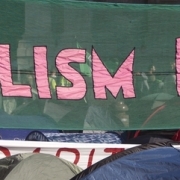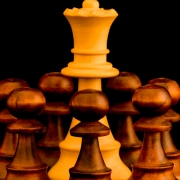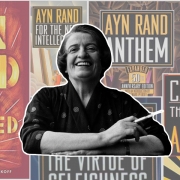Crime and Punishment is a great work of literary art by Russian author Fyodor Dostoevsky. It studies the psychopathology of guilt endured by the criminal himself. For Ayn Rand‘s sense of morality, to define justice in terms of punishment is backward. The achievement of principled values is essential to the human condition, and worthy of celebration. The moral sanction of our community and society is the ultimate reward for rational, virtuous behavior. Criminality is not the existential threat that deserves all the attention. Ayn Rand’s sense of justice expects admiration for heroes, and it should be commensurate with achievement, without subjective limits.
The Unspeakable “I”
In 1972, Olga Korbut transformed gymnastics by adding acrobatics to its ballet-like elegance, vaulting the sport to dreams of flying for young girls around the world. Four years later, Nadia Comaneci scored the first Olympic tens, the highest attainable, thereby creating a philosophical dilemma. Have the achievable limits of gymnastics been reached? Have the athletes merely surpassed a well-meaning, but subjective scoring system? Are the judges thumbs weighing on the scales of justice? Dare we question the motives of the egalitarian Olympic movement?
Enter Simone Biles, arguably the greatest gymnast on earth. In 2013, Biles won the All-Round competition at the US, then the World Championships, and amazed the World’s with her signature double layout with a half twist, aka “The Biles” (floor routine version) in 2014. She won an unprecedented third world All-Round the next year, and became an international sensation at the 2016 Olympics as a member of the US women’s incredible Final Five team. For the 2018 Worlds, she transformed The Biles for the vault (round-off on the springboard, half turn onto the vault, two full twists).
Last October, Biles won in a landslide at the Worlds by adapting The Biles for the beam (double twisting double dismount). However, her performance there will be remembered for “The Biles II,” a triple twisting double layout on her floor exercise routine. Former Olympic gold medalist and TV commentator Nastia Liukin said it best, “Simone’s got enough gold medals at home. Someone give this girl a crown.” Instead, her difficulty score on the beam was downgraded to “H” from its provisional “I” rating, even though no one else can do it.
Gymnastics has a necessarily complex scoring system, and great efforts are made for it to be transparent. Fortunately for human life on planet earth, there is an objective scoring system in free market economies, and no one needs to fabricate it – earned profit. The more difficult the challenge, the greater the profit for flawless execution. As Simone Biles rightfully earned the points for unprecedented difficulty and artistic execution, so has the entrepreneurial mind, for the same reasons.
It is Good. It is Mine.
Ayn Rand’s novel Atlas Shrugged portrays such a mind, the inventor and industrialist Henry Rearden. After years of grueling mathematical and chemical gymnastics, he created and patented Rearden Metal. A lighter, stronger, and cheaper alternative to steel, it was desperately needed to support millions of lives. Yet he was denied justice for the crime of being good. Moral sanction was reserved only for self-sacrifice.
In Atlas, Rearden confidently faced the threat of prison, confiscation of his intellectual property, and gaslighting by his family. His wife Lillian advised, “I think you should abandon the illusion of your own perfection. The day of the hero is past.” Hopefully, no one uttered those words to Simone Biles, and she’s received the public recognition her achievements deserve. However, she must endure the judgment of the International Gymnastics Federation (FIG),
The safety of the athletes is always a top priority and the sport in general, however the skill should be given the value it merits. There are many examples in the Code where decisions have been made to protect the gymnasts and preserve the direction of the discipline.
This is similar to the judgment Rearden endured from regulator Mouch, “The steel mills of the country are ordered to limit the production of any metal alloy to an amount equal to the production of other metal alloys by other mills.” After all, authoritarians dictate “the direction of the discipline” and “the safety of the athletes” according to their subjective merits, as these questions from Rearden’s Trial attest,
You speak as if you were fighting for some sort of principle, but what you’re actually fighting for is only your property, isn’t it? You pose as a champion of freedom, but it’s only the freedom to make money that you’re after!
According to espn.com, “FIG sometimes lowers the value of risky elements to make safer ones more attractive by comparison.” Perhaps FIG could ask Biles – You vault as if you’re fighting for your own values, aren’t you? You fly as a champion of human physiology, but it’s only the difficulty and execution points that you’re after!
Icarus Nails the Landing
There is no rational basis for dismissing or punishing what is good, only envy, whose cousin is guilt. Yet our postmodern culture believes money is the root of evil, profit an embarrassment, and wealth carries the weight of guilt to “give back.” Apparently, FIG believes that Simone is flying too close to the sun, as Icarus did in Greek mythology. Yet unlike Icarus, Simone returned triumphantly to earth, stuck the landing, and inspires millions of young people. Her beaming smile, like Rearden’s when pouring a ton of steel, is rooted in her rigid principles. As Ayn Rand reminds us in America’s Persecuted Minority,
Businessmen are the symbol of a free society – the symbol of America. If and when they perish, civilization will perish.
One criticism of Ayn Rand is that she lobbies for statues and ticker-tape parades for her high-flying Capitalist Heroes. Far from being elitists, they have no desire for glowing affirmation from parasites; only the assurance that production will not be punished and virtues of the mind will be revered, for their own sake. Ayn Rand can laugh because she had vetted the psychopathology of her critics in her novels. Her heroes reject self-sacrifice, and she repurposes mythology by promising a graceful landing for those who exercise Active Minds.













